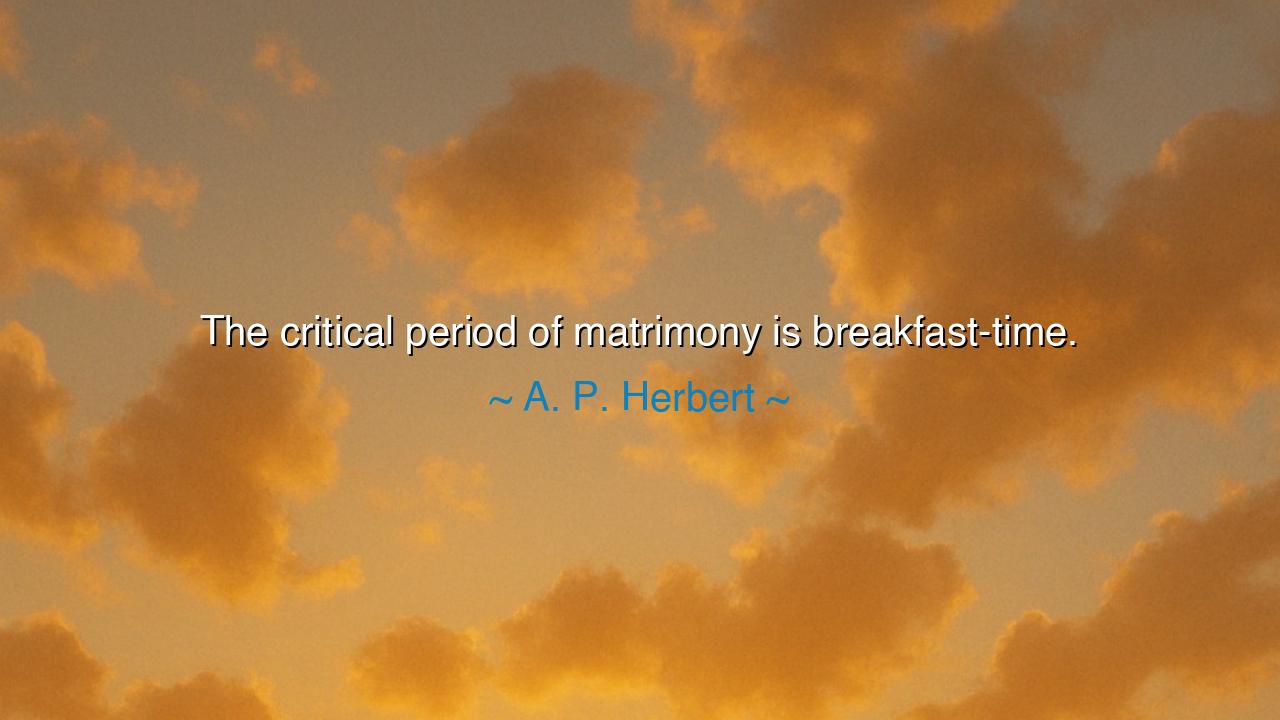
The critical period of matrimony is breakfast-time.






“The critical period of matrimony is breakfast-time.” So wrote A. P. Herbert, the English humorist, novelist, and keen observer of domestic life, whose wit often cloaked profound truth. At first glance, the saying seems light—a jest about the morning meal—but beneath its humor lies an insight as sharp as a blade: that the strength of marriage is tested not in grand gestures or dramatic moments, but in the quiet, ordinary hours when two souls meet in the small rituals of daily living. The critical period of any union is not the wedding day, but the mornings after—the everyday dawns where love must learn to live with reality.
To understand Herbert’s wisdom, one must see beyond the laughter. Breakfast-time represents that hour when pretense fades and truth sits plainly at the table. It is the beginning of the day, when hearts are unguarded and tempers short, when fatigue from yesterday mingles with the burdens of the new day ahead. Here, the masks worn for the world are not yet fastened; here, the small irritations—the unspoken words, the misplaced spoon, the silence between two weary hearts—reveal the true fabric of companionship. In such moments, love must show its patience, for tenderness is tested most in simplicity.
Herbert, though a man of wit, was a philosopher in disguise. His statement emerges from the observation that matrimony is not sustained by passion alone but by endurance, by small mercies exchanged amid the routine. Lovers in their youth imagine that storms or tragedies will be their great trials—but no, it is the mornings that measure the soul. The way one greets the day beside another—the courtesy offered, the tone of voice, the willingness to see the ordinary as sacred—these become the battlegrounds and triumphs of love. Breakfast-time is but a symbol: it is the hour when life demands not romance, but kindness.
Consider the story of Queen Victoria and Prince Albert, whose union was celebrated as one of devotion, yet was also filled with the friction of two strong wills. Letters and diaries reveal that their disagreements were not about kingdoms or politics, but about the smallest matters—the pace of conversation, the tone of a remark, the comfort of shared meals. And yet, each morning, they returned to one another, to speak again, to sit side by side, to renew their affection through daily ritual. In the quiet act of sharing breakfast, they forged a companionship that outlasted death. Their story teaches what Herbert knew: that love is proven not in crisis, but in constancy.
The critical period of marriage, then, is not one moment, but a thousand repeated dawns. Every day begins with a choice: to speak gently rather than harshly, to listen rather than dismiss, to treat the familiar as still precious. Many marriages fail not from betrayal or calamity, but from the slow erosion of tenderness—forgotten greetings, cold silences, the neglect of small courtesies. The morning table becomes the altar upon which love is either renewed or starved. Herbert’s humor hides a lament: that in the haste of modern life, couples forget that sacred beginning—the chance each day to rebuild trust through warmth and attention.
Yet his quote also carries hope. For if the critical period is so small, then salvation too lies close at hand. One kind word over coffee, one shared smile, one patient silence can restore what neglect has worn thin. The greatness of marriage is not in avoiding conflict, but in learning to face each morning anew, as if love itself were reborn with the sun. To cherish the ordinary is to master the art of enduring affection.
So, my listener, remember this teaching: the strength of a union is not measured by its height of joy, but by its depth of daily grace. Do not wait for great occasions to prove your love; prove it in the simple meal, the quiet glance, the soft word spoken when the day begins. Rise each morning as though to serve—not as servant to a master, but as one heart tending another. For the critical period of matrimony is not an hour on the clock, but a lifelong practice of care.
And thus, as Herbert knew, if a couple can greet each dawn with patience, laughter, and gratitude, then no storm will shake them. For love that survives breakfast-time—that hour of honesty, fatigue, and familiarity—is love that has already learned the secret of eternity.






AAdministratorAdministrator
Welcome, honored guests. Please leave a comment, we will respond soon